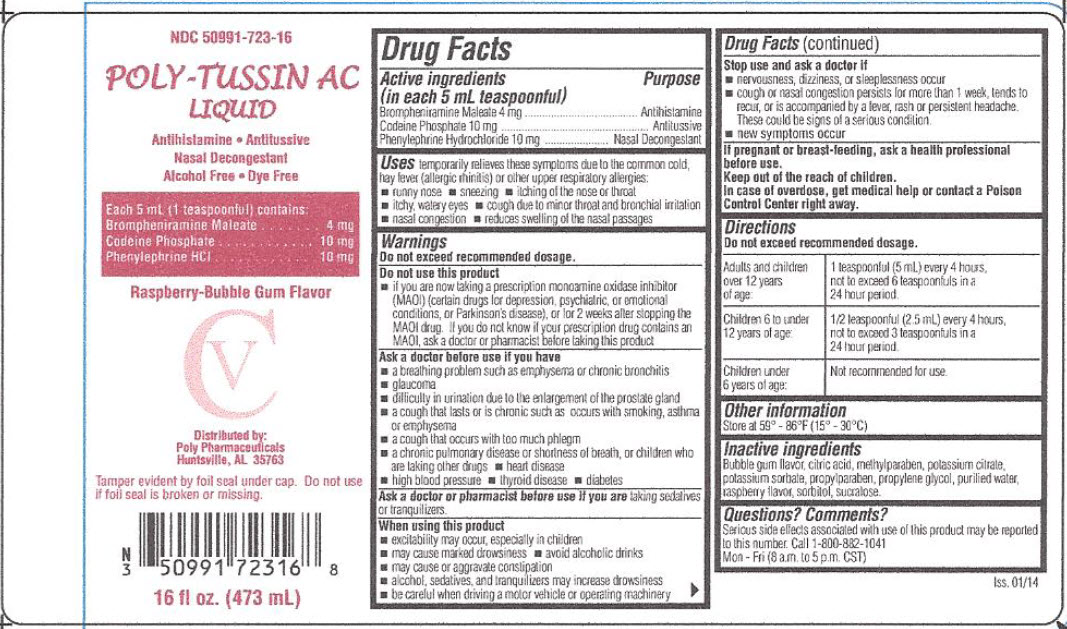FDA records indicate that there are no current recalls for this drug.
Are you a medical professional?
Trending Topics
Poly-tussin Ac Recall
Get an alert when a recall is issued.
Questions & Answers
Side Effects & Adverse Reactions
Do not exceed recommended dosage.
- if you are now taking a prescription monoamine oxidase inhibitor (MAOI) (certain drugs for depression, psychiatric, or emotional conditions, or Parkinson's disease), or for 2 weeks after stopping
-
a breathing problem such as emphysema or chronic bronchitis
-
glaucoma
-
difficulty in urination due to the enlargement of the prostate gland
-
a cough that lasts or is chronic such as occurs with smoking, asthma or emphysema
-
a cough that occurs with too much phlegm
-
a chronic pulmonary disease or shortness of breath, or children who are taking other drugs
-
heart disease
-
high blood pressure
-
thyroid disease
-
diabetes
taking sedatives or tranquilizers.
- excitability may occur, especially in children
- may cause marked drowsiness
- avoid alcoholic drinks
- may cause or aggravate constipation
- alcohol, sedatives, and tranquilizers may increase drowsiness
- be careful when driving a motor vehicle or operating machinery
-
nervousness, dizziness, or sleeplessness occur
-
cough or nasal congestion persists for more than 1 week, tends to recur, or is accompanied by a fever, rash or persistent headache. These could be signs of a serious condition.
-
new symptoms occur
ask a health professional before use.
In case of overdose, get medical help or contact a Poison Control Center right away.
- if you are now taking a prescription monoamine oxidase inhibitor (MAOI) (certain drugs for depression, psychiatric, or emotional conditions, or Parkinson's disease), or for 2 weeks after stopping
-
a breathing problem such as emphysema or chronic bronchitis
-
glaucoma
-
difficulty in urination due to the enlargement of the prostate gland
-
a cough that lasts or is chronic such as occurs with smoking, asthma or emphysema
-
a cough that occurs with too much phlegm
-
a chronic pulmonary disease or shortness of breath, or children who are taking other drugs
-
heart disease
-
high blood pressure
-
thyroid disease
-
diabetes
taking sedatives or tranquilizers.
Stop use and ask a doctor if-
nervousness, dizziness, or sleeplessness occur
-
cough or nasal congestion persists for more than 1 week, tends to recur, or is accompanied by a fever, rash or persistent headache. These could be signs of a serious condition.
-
new symptoms occur
Legal Issues
There is currently no legal information available for this drug.
FDA Safety Alerts
There are currently no FDA safety alerts available for this drug.
Manufacturer Warnings
There is currently no manufacturer warning information available for this drug.
FDA Labeling Changes
There are currently no FDA labeling changes available for this drug.
Uses
Temporarily relieves these symptoms due to the common cold, hay fever (allergic rhinitis) or other upper respiratory allergies:
- runny nose
- sneezing
- itching of the nose or throat
- itchy, water eyes
- cough due to minor throat and bronchial irritation
- nasal congestion
- reduces swelling of the nasal passages
History
There is currently no drug history available for this drug.
Other Information
There are no additional details available for this product.
Sources
Poly-tussin Ac Manufacturers
-
Poly Pharmaceuticals, Inc.
![Poly-tussin Ac (Brompheniramine Maleate, Codeine Phosphate, Phenylephrine Hydrochloride) Liquid [Poly Pharmaceuticals, Inc.]](/wp-content/themes/bootstrap/assets/img/loading2.gif)
Poly-tussin Ac | Poly Pharmaceuticals, Inc.
![Poly-tussin Ac (Brompheniramine Maleate, Codeine Phosphate, Phenylephrine Hydrochloride) Liquid [Poly Pharmaceuticals, Inc.] Poly-tussin Ac (Brompheniramine Maleate, Codeine Phosphate, Phenylephrine Hydrochloride) Liquid [Poly Pharmaceuticals, Inc.]](/wp-content/themes/bootstrap/assets/img/loading2.gif)
Do not exceed recommended dosage.
Adults and children over 12
years of age:
1 teaspoonful (5 mL) every 4 to 6 hours, not to exceed
6 teaspoonfuls in a 24 hour period.
Children 6 to under 12 years of age:
1/2 teaspoonful (2.5 mL) every 4 to 6 hours, not to exceed
3 teaspoonfuls in a 24 hour period.
Children under 6 years of age:
Not recommended for use.
Login To Your Free Account


